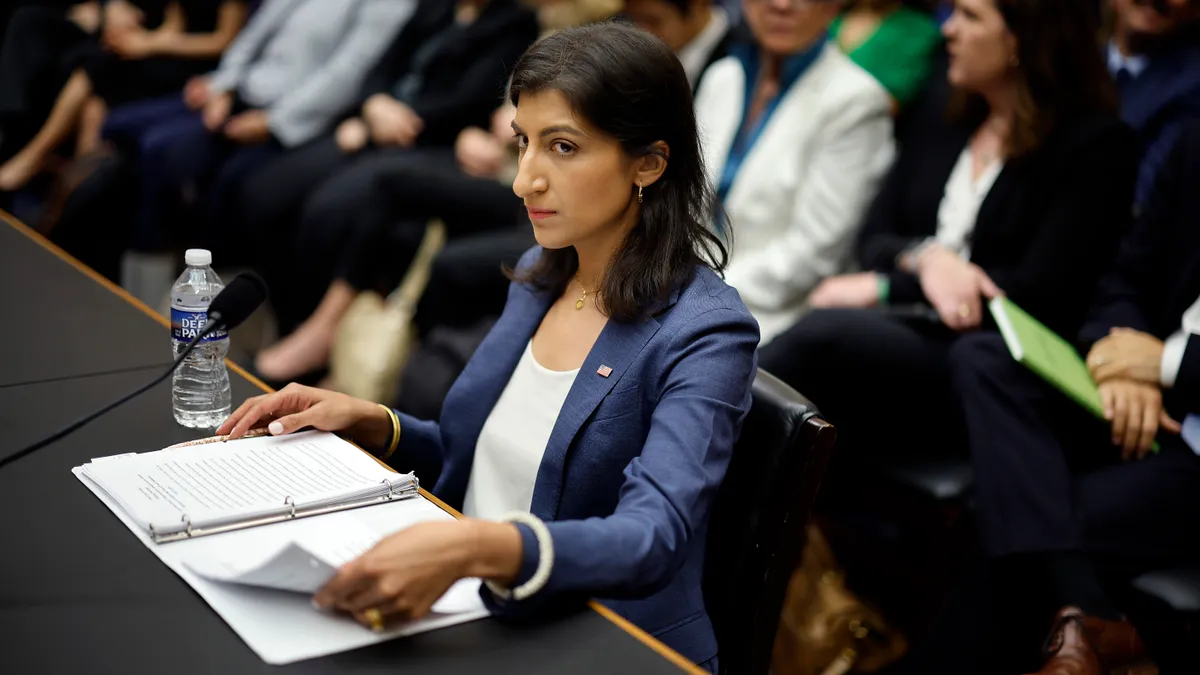The revamped vision of what antitrust law in the United States should look like, outlined in an academic paper by Federal Trade Commission Chair Lina Khan when she was a law student in 2017, could be put to the test later this month when the FTC sues Amazon for the way it uses its marketplace platform to dominate competitors.
The FTC is expected to file an antitrust lawsuit in mid-September against Amazon for how it charges third-party sellers to use its industry-dominating online platform and ties sellers into using its logistics services.
The agency and company officials met last month to resolve differences over Amazon’s practices but came to no resolution, paving the way for the lawsuit, The Wall Street Journal reported.
“Amazon’s lawyers didn’t offer specific concessions,” the Journal said. Nor did the FTC outline what remedies it was looking for even though company lawyers were said to be pressing the agency for clues on what would prevent a lawsuit.
“Given the FTC’s yearslong investigation of Amazon, it is unclear whether concessions would have stopped the agency from filing a lawsuit,” the Journal said.
Federal target
Amazon is already the subject of several lawsuits by the FTC, including over the way it collects consumer information and how it uses so-called dark patterns to make it easy for people to sign up for Amazon Prime but hard to cancel it.
Should the FTC go after the company on antitrust grounds, it could be the sweeping lawsuit that Khan envisioned in her paper and that she has championed over her entire legal career, including as a staff counsel on the House Judiciary Committee’s antitrust subcommittee.
Khan’s nomination in 2021 to head up the FTC included support from Republicans who liked the idea of a strong antitrust fighter to help keep companies’ market dominance in check, but her tenure hasn’t been smooth.
Critics have accused her of running roughshod over dissent. Christine Wilson, an FTC commissioner until she resigned earlier this year, was a frequent critic of Khan’s approach, as have been others who say her take-no-prisoners approach to antitrust has led her to starting fights she can’t win.
“You’re a bully,” Rep. Darrell Issa (R-Calif.) said in a House Judiciary Committee hearing earlier this year. “You are thinking only of who you want to go after for some reason. And I cannot find your logic.”
Antitrust views
That logic is located at least in part in Khan’s 2017 paper, called Amazon’s Antitrust Paradox, in which she says the federal government’s approach to competition doesn’t reflect the realities of online commerce.
For decades, she said, the focus has been mainly on consumer prices. As long as prices remain low, under the federal government’s approach, the market is working as it should, because if competition were stifled, prices would go up.
But Amazon has built its business on keeping prices so low, even at the expense of profits, that it has come to dominate all aspects of online commerce. As a result, it has little meaningful competition in online sales and it exercises market-dominating influence over what gets sold, by whom, and how goods get delivered to buyers, among other things.
What’s needed, she said, is a broader look at the structure of online commerce so that one company doesn’t come to dominate the entire sales infrastructure, as Amazon has.
“The company has positioned itself at the center of ecommerce and now serves as essential infrastructure for a host of other businesses that depend upon it,” she said. “Elements of the firm’s structure and conduct pose anticompetitive concerns—yet it has escaped antitrust scrutiny.”
Scrutiny coming
Later this month, should the FTC file its lawsuit, the company might finally get the scrutiny Khan has been pushing for. But Khan’s approach will get scrutiny, too.
None of the major antitrust lawsuits the FTC has brought under Khan has given the agency a win, exposing Khan to criticism that her tactics aren’t working in the courts.
“You are now 0 for 4 in merger trials,” Rep. Kevin Kiley (R-Calif.) said at the House Judiciary Committee hearing. “Why are you losing so much?”
Among other cases, the FTC lost to Meta in its acquisition of virtual fitness app Within Unlimited and to Microsoft in its acquisition of gamemaker Activision Blizzard.
Win or lose, Khan said, it’s important for the agency to bring the cases. “We fight hard when we believe there was a law violation, and unfortunately things don’t always go our way,” she said.











